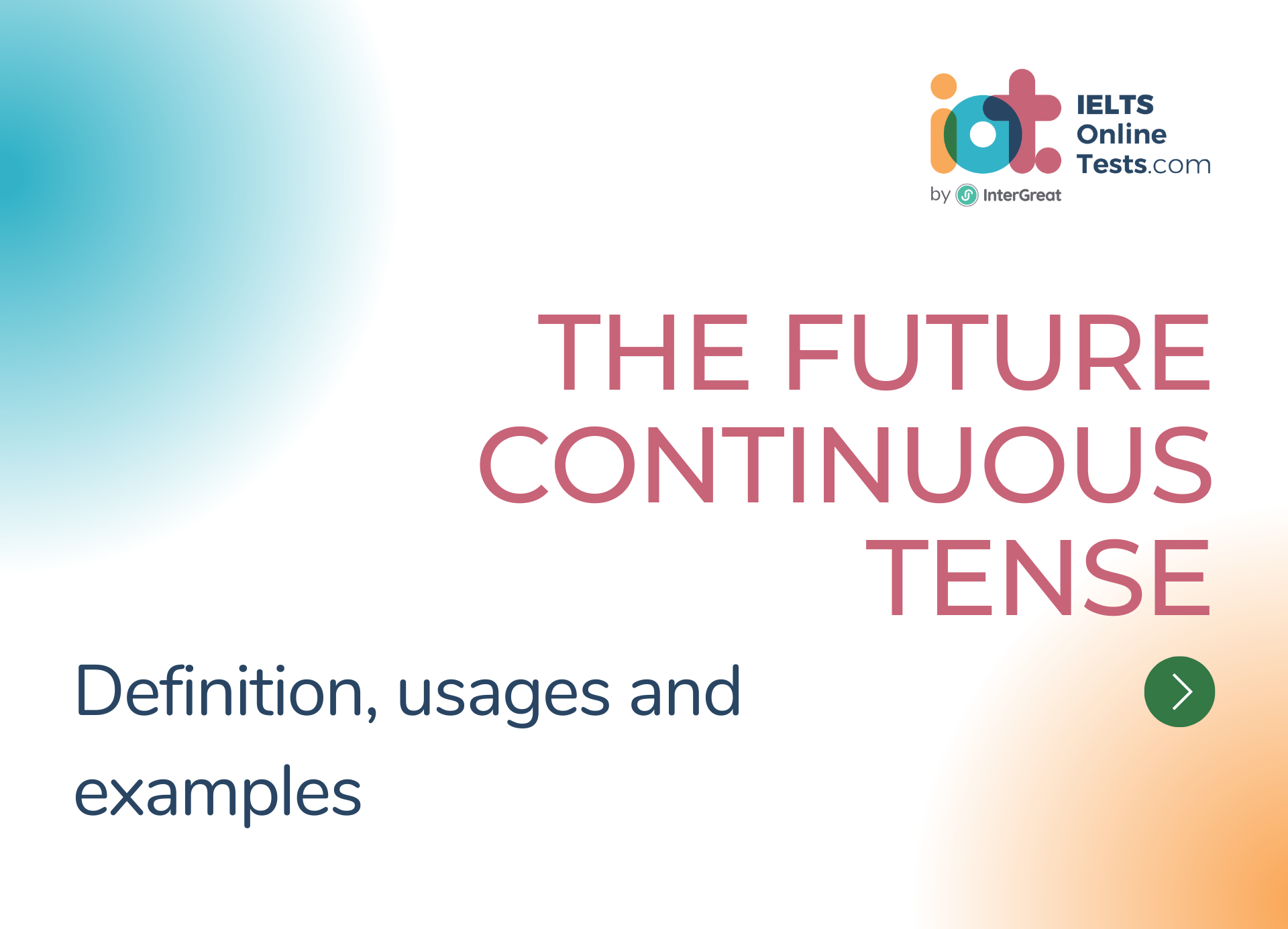
Thì tương lai tiếp diễn (The future continuous tense) định nghĩa và ví dụ
Thì tương lai tiếp diễn (Future continuous tense) dùng để diễn tả một hành động, sự việc sẽ đang diễn ra tại một thời điểm cụ thể trong tương lai.
Dưới đây là thông tin chi tiết về cấu trúc, cách sử dụng và trạng từ thường đi kèm với thì tương lai tiếp diễn:
I. Cấu trúc:
- Khẳng định:
- S + will + be + V-ing + O
- Ví dụ:
- They will be studying for the exam tomorrow. (Họ sẽ đang học cho kỳ thi ngày mai.)
- Phủ định:
- S + will + not + be + V-ing + O
- Ví dụ:
- She will not be working at that time. (Cô ấy sẽ không đang làm việc vào thời điểm đó.)
- Nghi vấn:
- Will + S + be + V-ing + O?
- Ví dụ:
- Will you be watching a movie? (Bạn sẽ đang xem một bộ phim?)
II. Cách sử dụng:
Diễn tả hành động đang diễn ra trong tương lai tại một thời điểm cụ thể:
Thì tương lai tiếp diễn được sử dụng để diễn tả những hành động đang diễn ra trong tương lai tại một thời điểm cụ thể.
Ví dụ:
She will be talking on the phone when I arrive. (Cô ấy sẽ đang nói chuyện qua điện thoại khi tôi đến.)
Diễn tả hành động đang diễn ra trong tương lai trong một khoảng thời gian:
Thì này cũng được sử dụng để diễn tả những hành động đang diễn ra trong tương lai trong một khoảng thời gian.
Ví dụ:
We will be playing soccer for two hours. (Chúng tôi sẽ đang chơi bóng đá trong hai giờ.)
III. Các trạng từ thường đi kèm:
- At that time (vào thời điểm đó):
- She will be studying at that time. (Cô ấy sẽ học vào thời điểm đó.)
- While (trong khi):
- They will be playing video games while waiting for the bus. (Họ sẽ chơi trò chơi điện tử trong khi chờ xe buýt.)
- All day (cả ngày):
- I will be working in the garden all day tomorrow. (Tôi sẽ làm việc trong vườn cả ngày mai.)
IV. Các lưu ý khi sử dụng thì tương lai tiếp diễn:
Diễn tả hành động đang diễn ra trong tương lai:
Thì tương lai tiếp diễn được sử dụng để diễn tả hành động dự kiến sẽ đang diễn ra trong tương lai tại một thời điểm cụ thể.
Ví dụ:
They will be studying for the exam tomorrow. (Họ sẽ đang học cho kỳ thi ngày mai.) She will be cooking dinner at 7 PM. (Cô ấy sẽ đang nấu bữa tối lúc 7 giờ tối.)
Diễn tả hành động dự định hoặc lên lịch trong tương lai:
Thì này cũng có thể được sử dụng để diễn tả hành động đã được lên lịch hoặc dự định trong tương lai.
Ví dụ:
I will be working on a project next week. (Tôi sẽ đang làm việc trên một dự án vào tuần tới.) They will be traveling to Europe in the summer. (Họ sẽ đang đi du lịch đến châu Âu vào mùa hè.)
Sự so sánh giữa thì tương lai tiếp diễn và thì tương lai đơn:
Thì tương lai tiếp diễn diễn tả hành động đang diễn ra trong tương lai tại một thời điểm cụ thể, trong khi thì tương lai đơn chỉ diễn tả hành động dự kiến sẽ xảy ra trong tương lai.
Ví dụ:
She will be cooking dinner at 7 PM. (Cô ấy sẽ đang nấu bữa tối lúc 7 giờ tối.) - Thì tương lai tiếp diễn
She will cook dinner later. (Cô ấy sẽ nấu bữa tối sau đó.) - Thì tương lai đơn
- Động từ "be" và "will be" trong thì tương lai tiếp diễn:
Cấu trúc của thì tương lai tiếp diễn là "will be" + V-ing. Động từ "be" (am/is/are) được sử dụng như một trợ động từ trong thì này.
Ví dụ:
I will be studying. (Tôi sẽ đang học.)
They will be playing soccer. (Họ sẽ đang chơi bóng đá.)
Thực hành sử dụng thì tương lai tiếp diễn trong các câu khác nhau sẽ giúp bạn nắm vững cách sử dụng và tự tin trong việc diễn đạt ý nghĩa và thông tin với thì này.




